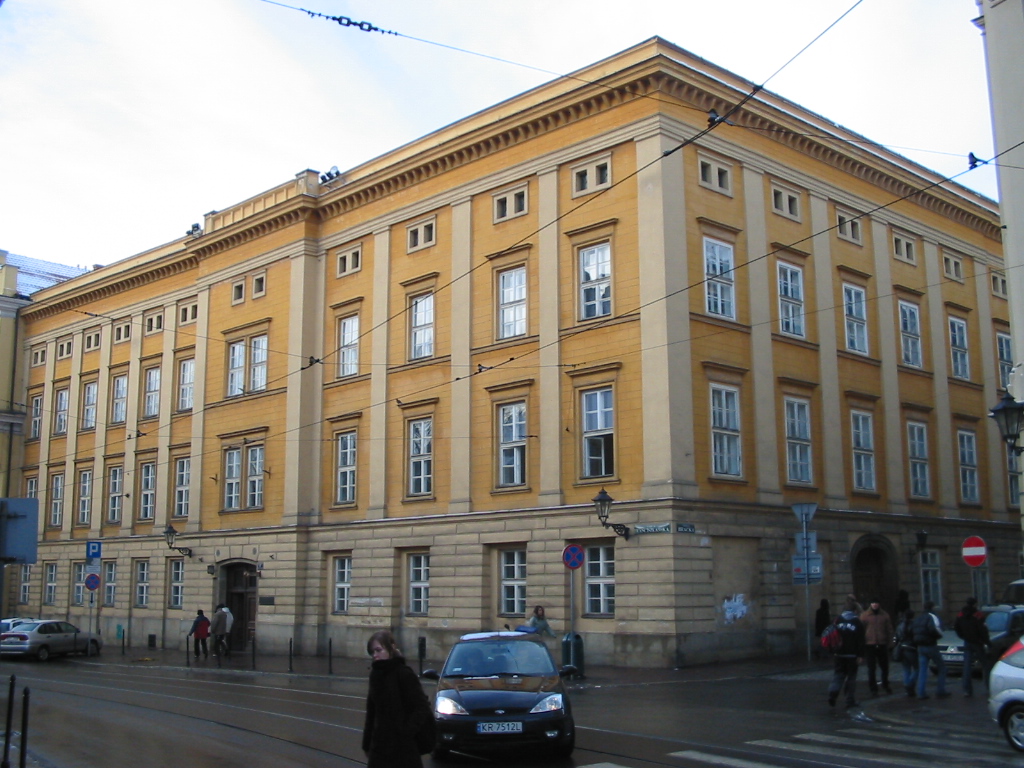- Pontifical Academy of Theology
Infobox University
name = The Pontifical Academy of Theology
in Kraków
native_name = Papieska Akademia Teologiczna
w Krakowie
image_size = 280px
caption = Main building at ul. Franciszkańska
latin_name =
motto =
established =1981
type = Public
endowment =
staff =
rector = Prof. dr hab. Jan Maciej Dyduch
enrollment = 3000
undergrad =
postgrad =
doctoral =
profess =
city =Kraków
state =
country =Poland
campus = Urban
free_label =
free =
colours =
affiliations =
footnotes =
website = http://www.pat.krakow.pl/eng/dzialy.php?id=past
address = ul. Kanonicza 25, 31-002 Kraków
publictransit =
telephone = (48 12) 421-84-16
coor =The Pontifical Academy of Theology ( _pl. Papieska Akademia Teologiczna w Krakowie) is an institution located in
Kraków ,Poland , that offersgraduate degree s intheology ,philosophy , andchurch history . It derives from the theology faculty ofJagiellonian University , which was established in1397 . The theology faculty was expelled from the university by Communist authorities in1954 . Remaining under the supervision of the Vatican, the faculty received the honorific title of "Pontifical" in1974 and was established as an academy byPope John Paul II in1981 .History
Kraków Academy and Jagiellonian University
The Faculty of Theology at the
Kraków Academy was originally established at the request ofQueen Jadwiga and her husbandJagiełło . On11 January 1397 PopeBoniface IX signed a bull allowing for the foundation of the Faculty. In the restoration act of26 July 1400 the Faculty of Theology was listed as the most important faculty of the Academy. Professors of the Faculty were involved in thechristianization ofLithuania . Kraków Academy becameJagiellonian University in1817 .Throughout the existence of the Kingdom of Poland and further, during the partitions, and after the return to independence in 1918, most rectors of the Kraków Academy were drawn from theologians, who would become its most prominent personalities. Thanks to their reputation and the greatest number of students, the Academy was one of the main centres of Polish theological learning.
During
World War II many professors of the Faculty were prisoners of theNazi concentration camps . In spite of wartime repressions and deaths, underground education was carried out. In 1945 the teaching staff of the Faculty included professors from the Polish Eastern borderlands (i.e.Lvov ).After expulsion
In
1954 the Faculty of Theology was removed from the university by an edict of the communist Cabinet. However, the Vatican issued a decree in1959 stating that the Faculty of Theology "remains under the supervision of one ecclesiastic authority and in the future is to be formed according to the laws passed by the Apostolic see". In 1974 owing to the efforts of CardinalKarol Wojtyła , the Archbishop of Kraków and future Pope John Paul II, the Faculty was bestowed the honourable title Pontifical.The Pontifical Academy of Theology was established by Pope
John Paul II on8 December 1981 , when he issued amotu proprio document entitled "Beata Hedvigis" prescribing that the Pontifical Academy be derived from an age-old Faculty of Theology of theJagiellonian University . [Open Society Archives, Pope John Paul II In Poland [http://files.osa.ceu.hu/holdings/300/8/3/text/47-3-119.shtml] ]Today
The Pontifical Academy of Theology carries on the traditions of the Faculty of Theology of the Jagiellonian University. It co-sponsors the international Center for Interdisciplinary Studies in science, and fosters scholarly works oriented toward bridging the gap between the natural sciences and the humanities. [Center for Interdisciplinary Studies, "Philosophy in Science" [http://64.233.167.104/search?q=cache:DFJk6b02QosJ:www.obi.opoka.org.pl/philosci/+The+Pontifical+Academy+of+Theology&hl=en&ct=clnk&cd=19&gl=ca] ]
People
Michał Heller , recipient of the2008 Templeton Prize , was a significant figure in the establishment of the Academy and continues to teach there today. Also associated with the Faculty in its early days wereKarol Wojtyła (Pope John Paul II) andJózef Życiński .Organizational structure
Faculties
* Theology
* Philosophy
* Church historyFaculties include institutes, sometimes inter-departmental, with one or more specializations:
:*Institute of
Bioethics [K. Szczygieł, "Teachings in bioethics from the Pontifical Academy of Theology in Cracow" [http://www.ncbi.nlm.nih.gov/sites/entrez?cmd=Retrieve&db=PubMed&list_uids=10816955&dopt=Abstract] ] [M. Griniezakis, N. Symeonides, "Bioethics and Christian theology." [http://www.ncbi.nlm.nih.gov/sites/entrez?Db=PubMed&Cmd=ShowDetailView&TermToSearch=16285130&ordinalpos=1&itool=EntrezSystem2.PEntrez.Pubmed.Pubmed_ResultsPanel.Pubmed_RVAbstractPlus] ] :*Institute ofEcumenism and Dialogue:*Language School:*Postgraduate Studies of JournalismEnrollment
The Academy confers the degrees of master,
licentiate , doctor and habilitated doctor. The faculties cooperate with numerous universities in Poland and abroad by organizing various symposia, sessions and interdisciplinary seminars, some of them international.ee also
*
Religion in Poland
*Roman Catholicism Footnotes
References
* [http://www.pat.krakow.pl/eng/dzialy.php?id=past Pontifical Academy of Theology, homepage]
* [http://www.vatican.va/holy_father/john_paul_ii/motu_proprio/index.htm The Holy See's "motu proprio" list ofPope John Paul II ]
Wikimedia Foundation. 2010.
